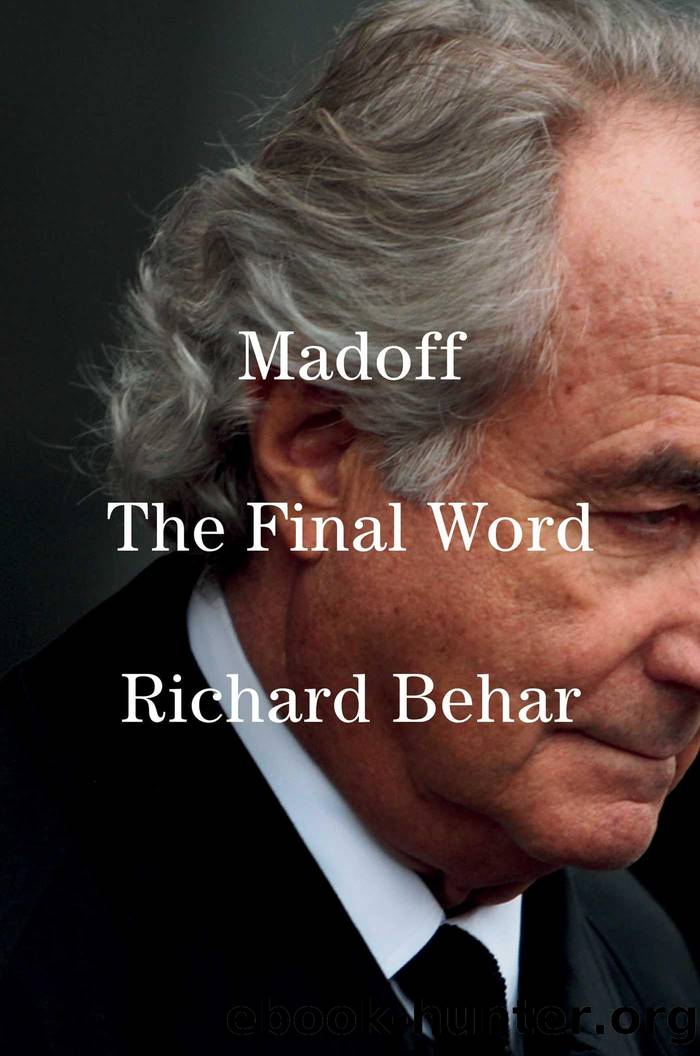Madoff: The Final Word by Richard Behar

Author:Richard Behar [Behar, Richard]
Language: eng
Format: epub
Tags: Biography & Autobiography, Business, Criminals & Outlaws, History, United States, 21st Century, Social Science, Sociology, General
ISBN: 9781476726892
Google: bwcOEQAAQBAJ
Amazon: 1476726892
Publisher: Simon and Schuster
Published: 2024-07-09T00:00:00+00:00
9 The Ponziâs Engine: JPMorgan Chase
Go to your favorite search engine and type in this name: âGregory Jude Johnsonâ and the words âJPMorgan Chase.â Next to nothing, right? Well, therein lies a tale.
At the time of the Madoff Ponziâs collapse in 2008, JPMorgan Chase (JPMC, Chase) was the largest bank in the United States and the sixth-largest in the world by total assets, with $2 trillion. By early 2024, it was the worldâs fifth largest, with assets approaching $4 trillion. In terms of market capitalization (the value of a publicly traded company), itâs the worldâs top bank by far, at just over $500 billion.
While it was hardly the only giant bank to help Bernie facilitate his Ponzi scheme in various ways, it is impossible to overstate JPMCâs key role in the fraud. As the bank and several of its predecessor institutions, such as Chemical Bank and Chase Manhattan, sat idly by, Bernie ran his Ponzi primarily out of that single Chase checking account ending in 703.
As for Chaseâs importance for Bernie to carry out his Ponzi, former prosecutor Lisa Baroni, who was part of a team of federal investigators that dug into Chaseâs relationship with Madoff, puts it succinctly: âBernie without Chase doesnât exist. If he had a bank that actually paid attention to the ins and outs of the account, then the Ponzi scheme definitely couldnât have been sustained for so long.â No fewer than a dozen executives at JPMC ignored the red flags about the 703 account that landed in their lapsâand there were many. The bankâs role in historyâs greatest known fraud should be the subject of a course in the countryâs top business schools, but not a single one offers it.
For several years after the Ponzi exploded, JPMC publicly maintained that âall personnel acted in good faithâ during the decades of its relationship with Madoff. It wasnât true. And in 2014 JPMC, in order to avoid pleading guilty to a criminal indictment, admitted to a set of damning facts about its colossal failures, paying $2.6 billion in fines, penalties, and settlementsârepresenting barely .1 percent of its assets, but a penalty nonetheless. Apart from that deal (known as a âdeferred prosecution agreementâ or DPA), no bank employees were prosecuted. That fact generated some public outrage at the time, particularly because not a single banker anywhere had gone to prison in relation to the overall 2008 fiscal crisis, which was directly traceable to the banking industry.
Tempting as it is, it is difficult to blame prosecutors for the fact that no bankers were held to account for the Madoff scam. While the collective behavior of those at Chase may have been prosecutableâhence the finesâit is difficult to jail a company, an abstraction. And the behavior of any single individual Chase officer or employee did not appear to cross the sometimes too-forgiving bar for criminality.
There was one exception, almost: the aforementioned Gregory Jude Johnson, head of compliance for JPMCâs investment bank in the United States, a title he held there
Download
This site does not store any files on its server. We only index and link to content provided by other sites. Please contact the content providers to delete copyright contents if any and email us, we'll remove relevant links or contents immediately.
| Africa | Asia |
| Canadian | Europe |
| Holocaust | Latin America |
| Middle East | United States |
Fanny Burney by Claire Harman(26602)
Empire of the Sikhs by Patwant Singh(23084)
Out of India by Michael Foss(16853)
Leonardo da Vinci by Walter Isaacson(13336)
Small Great Things by Jodi Picoult(7139)
The Six Wives Of Henry VIII (WOMEN IN HISTORY) by Fraser Antonia(5514)
The Wind in My Hair by Masih Alinejad(5095)
A Higher Loyalty: Truth, Lies, and Leadership by James Comey(4960)
The Crown by Robert Lacey(4814)
The Lonely City by Olivia Laing(4801)
Millionaire: The Philanderer, Gambler, and Duelist Who Invented Modern Finance by Janet Gleeson(4478)
The Iron Duke by The Iron Duke(4354)
Papillon (English) by Henri Charrière(4274)
Sticky Fingers by Joe Hagan(4197)
Joan of Arc by Mary Gordon(4109)
Alive: The Story of the Andes Survivors by Piers Paul Read(4031)
Stalin by Stephen Kotkin(3965)
Aleister Crowley: The Biography by Tobias Churton(3640)
Ants Among Elephants by Sujatha Gidla(3467)
